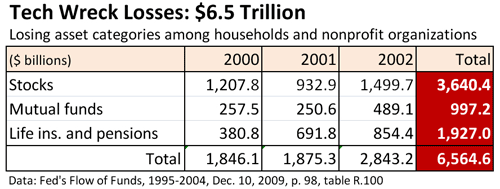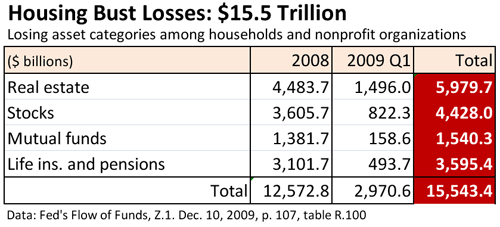The Greatest Money War of All Time
Stock-Markets / Financial Crash Feb 08, 2010 - 09:16 AM GMTBy: Martin_D_Weiss
 We are caught in the grips of a great war!
We are caught in the grips of a great war!
It is not a traditional land or sea war with tanks and battleships.
Nor is it an anti-terrorist, guerilla war for hearts and minds.
Rather, it is war of a third kind — pitting government bureaucrats against millions of investors … and causing massive collateral damage to innocent Americans.
Battle by battle, this great war has been escalated — each time with bigger guns deployed by Washington, each time with deadlier attacks striking Wall Street or Main Street …
Battle #1 began in Thailand in 1997 when global investors suddenly ran from its currency, dumped its stocks and abandoned its real estate.
Within weeks, the contagion spread to neighboring countries; within months, the fallout forced Russia to default on its sovereign debts.
Long Term Capital Management, a major player in the high-risk derivatives market, went under. Wall Street was on the verge of an unprecedented meltdown. The Dow plunged.
But the U.S. Federal Reserve responded swiftly, opening the money spigots full throttle and temporarily putting out the fires.
Soon, the pundits came out of hiding. They said the crisis was over. They swore up and down that the Fed had won the war.
However, any appearance of victory was deceptive in the extreme. All the Fed had really accomplished was to win a single battle, postpone the inevitable collapse, and in the process, help create another, far larger problem: the Tech Bubble of 1998-1999.
Investors, flush with cheap cash, rushed headlong into worthless IPOs. Harebrained business models prevailed. The Nasdaq DOUBLED in just one year.
Battle #2 began when the Tech Bubble turned into the Tech Wreck of 2000-2002.
Investors dumped their grossly overvalued dot-com stocks. Within weeks, the contagion of selling spread to other technology companies; within months, it spilled over into the entire economy.

According to the above data compiled by the Fed, before it was over, U.S. households had suffered …
- Losses of $3.6 trillion in stocks
- Losses of $997 billion losses in mutual funds, plus
- Losses of $1.9 trillion in life insurance and pension fund reserves
Total Tech Wreck losses: $6.6 trillion. (For the proof, click here.)
This time, the Fed responded with even bigger guns: To avert an all-out deflation, Chairman Alan Greenspan not only dropped interest rates to their lowest level since World War II, but he kept them at those extraordinary low levels for the longest period since the Great Depression.
He pumped cheap money into the economy like never before. He virtually banished the fear of risk. And, as a direct result, tens of trillions in borrowed dollars rushed into the U.S. housing market.
Again, the pundits swore the worst of the crisis had passed. Again, the government claimed it had scored a victory. Again, they were dead wrong.
Battle #3 was the monster born from the ashes of Battle #2: The Fed’s response to the Tech Wreck created the Housing Bubble, which, in turn, spawned the Housing Bust.
And alas, the losses resulting from the Housing Bust of 2007-2009 were 2.4 times greater than the losses from the Tech Wreck of 2000-2002.

According to recently released Fed data, even excluding the early real estate losses of 2007, the Housing Bust caused U.S. households …
- Losses of $6.0 trillion in real estate
- Losses of $4.4 trillion in stocks
- Losses of $1.5 trillion in mutual funds, and
- Losses of $3.6 trillion in life insurance and pension fund reserves
Total Housing Bust losses: $15.5 trillion. (For the proof, click here.)
Combined losses suffered during the Tech Wreck and the Housing Bust: $22.1 trillion.
Yet now, under a new administration, the bailout brigades are up to their old tricks.
For a third time, they’ve retaliated with easy-money fire hoses, this time driving short-term interest rates to practically ZERO.
For a third time, they’ve deployed bigger guns. This time, with bailouts and stimulus that add up to 30 percent of GDP — TEN times more than the average of all prior postwar recessions.
And again, they’ve had the audacity to declare “victory” … to say that the “crisis is over” … and proclaim that the “recovery is sustainable.”
Inevitable result: Another gigantic bubble, another bust, and another round of devastating losses — this time in sovereign government debt (e.g., Treasury bonds).
This is why the collapses of sovereign debt markets in Greece, Spain, and Portugal are so alarming. (See “The Next Contagion.”)
And this is why the Obama budget — including an astonishing $1.6 trillion deficit in the current fiscal year — is so dangerous.
My recommendations are unchanged:
Avoid all long-term bonds, whether issued by federal governments, private corporations, or municipalities.
Approach all stock investments with great CAUTION — tight stop losses, plenty of cash, and solid hedges.
Above all, do not fall for this new deception. Keep your money safe. Make sure you’re not engulfed in the next round of collateral damage.
Good luck and God bless!
Martin
This investment news is brought to you by Money and Markets. Money and Markets is a free daily investment newsletter from Martin D. Weiss and Weiss Research analysts offering the latest investing news and financial insights for the stock market, including tips and advice on investing in gold, energy and oil. Dr. Weiss is a leader in the fields of investing, interest rates, financial safety and economic forecasting. To view archives or subscribe, visit http://www.moneyandmarkets.com.
© 2005-2022 http://www.MarketOracle.co.uk - The Market Oracle is a FREE Daily Financial Markets Analysis & Forecasting online publication.



